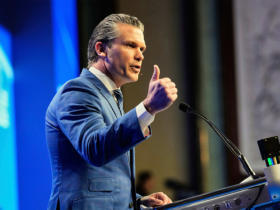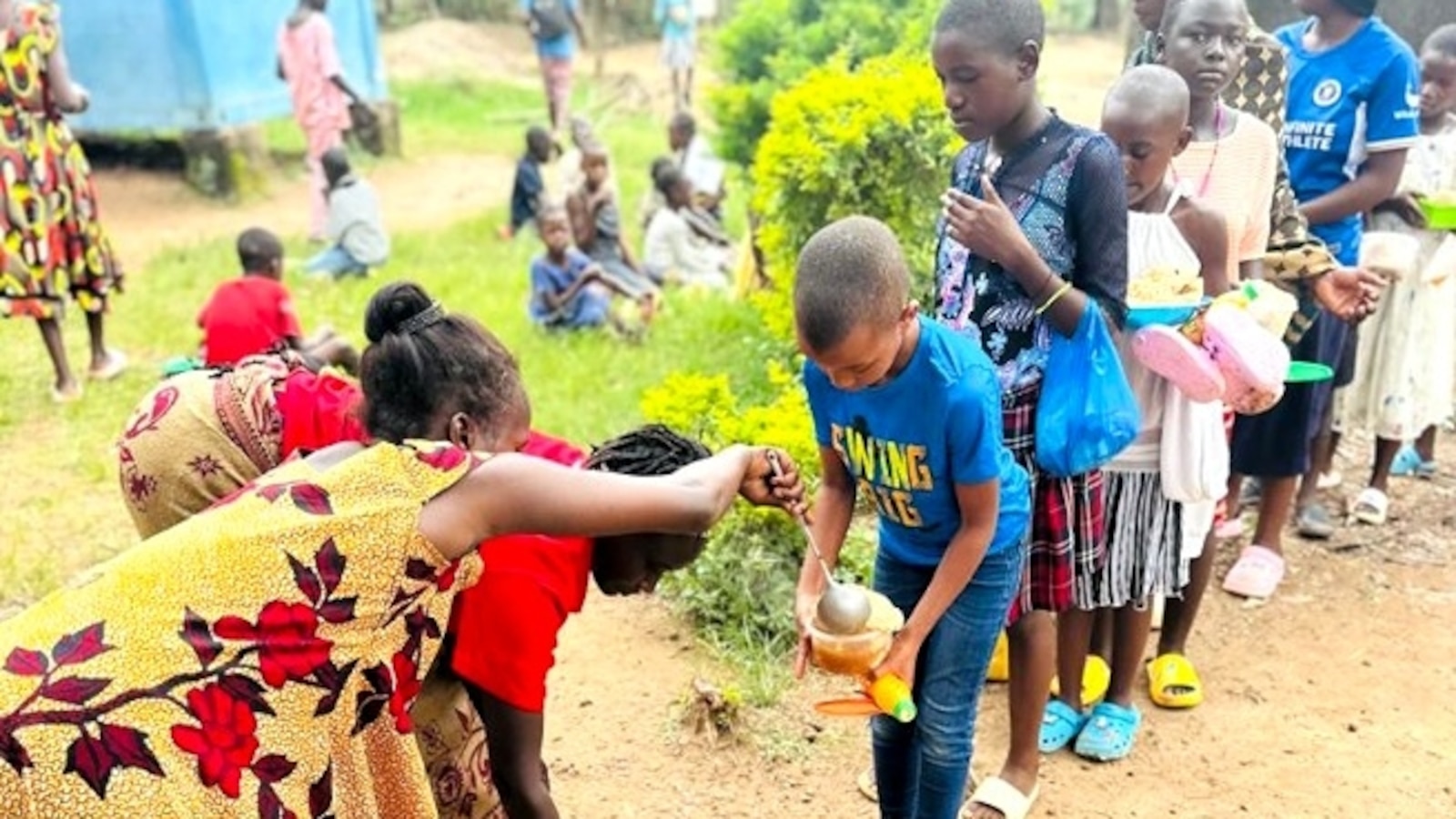Nearly 200 children live in a hillside village on the border of Kampala, Uganda. They are given food, shelter and an education at the Light the Future Foundation, a school and orphanage founded by Patrick Ssenyondo.
The organization provides critical care for HIV-positive children who have been left by their parents in the east African country.
“Most of the children here lost their parents, and those that have them, they can’t take care of them,” Ssenyondo told ABC News. “They can’t pay their tuition, they cannot pay for their medication, they can’t pay for food.”
Children at the Light the Future Foundation school and orphanage wait for food.
Patrick Ssenyondo/Light the Future Foundation
The children, who are facing the unimaginable, now have another blockade to survival.
On Jan. 20, President Donald Trump signed an executive order that suspended foreign aid for 90 days. Later came the termination of several foreign aid contracts, which have upended facilities and organizations like the Light the Future Foundation.
Ssenyondo told ABC News that his foundation used to have a month’s supply of medication prior to the cuts. Now, he’s resorted to rationing the children’s medication, only having a week’s supply since the cuts have taken place
While no child has died at his center, the children’s 28-year-old teacher, Ms. Mary, passed away after Ssenyondo says she wasn’t able to access her antiretrovirals — a result of the USAID cuts.

Ms. Mary, pictured in the yellow dress, serves food to children.
Patrick Ssenyondo/Light the Future Foundation
That’s a fate Ssenyondo hopes won’t fall on the children. He told ABC News he can’t bear to tell them they aren’t getting their medications.
“If you tell one child that you know, we are no [longer] getting medication for your AIDS, so you’re going to lose your life,” Ssenyondo said. “That’s something we cannot do. So we keep quiet.”
In another part of rural Uganda, Bayo Emmanuel, founder of the Bright Star Orphanage, shared a similar story. The eight HIV positive orphans he cared for got their medication for free prior to the cuts.
After the cuts, Emmanuel said he was told he should turn to the private sector, where he would have to pay for their medication. He couldn’t afford all of the children’s medication and the orphanage ran out.
One of the children, 14-year-old Migande Andrew, quickly fell ill.
“He got weaker and weaker every day and lost his life in the process,” Bayo told ABC News.
The community he loved gathered to say their goodbyes, burying him on Feb. 21.
Uganda has one of the highest rates of HIV in the world. Migande Andrew and Ms. Mary are just two of an estimated 53,000 HIV-related deaths worldwide resulting from US Aid cuts, according to Boston University’s PEPFAR Impact Tracker. This tool tracks the impact of the President’s Emergency Plan for Aids Relief, created by George W. Bush in 2003 and credited with saving 20 million lives around the globe.
Today, the tool projects more than 9,000 children’s lives could be lost globally by the end of 2025 if services aren’t restored.

Migande Andrew, 14, enjoys a meal with friends.
Bayo Emmanuel/Bright Star Orphanage
Earlier this year, the Trump administration announced it was terminating 90% of its foreign aid contracts and cutting $60 billion in funding for international programs that support everything from famine relief to fighting infectious diseases like HIV and AIDS.
The administration has denied any lives have been lost in connection to the recent cuts. On Feb. 4, Secretary of State Marco Rubio addressed the cuts during a press conference.
“We’ve issued waivers because we don’t want to see anybody die or anybody be harmed in the short term,” he said. “But we’re going to conduct a review, and we are going to have foreign aid in this country that is going to further the national interests of the United States.”
In a tense May 21 exchange before members of the Senate Foreign Committee, Rubio said he was very proud of the work the administration has done so far with USAID, though he was questioned by several lawmakers as to the severity of the cuts.
Despite the abrupt termination of resources from the U.S., people in Uganda are doing everything they can to keep their communities alive.
To the west of Kampala, a clinic called The Family Hope Center is still running due to the strength and resilience of its workers. Since March, all staff have been working for free.

Migande Andrew’s friends bid farewell to the 14-year-old at his funeral in February.
Bayo Emmanuel/Bright Star Orphanage
The center has provided comprehensive HIV care and treatment services since 2005. It’s been a lifeline for just under 4,000 patients, who are now unsure of how the center will be funded.
“If we are not working, that means more people are going to get HIV, more people will drop out of care,” Mubezi Peruth, a nurse at the center, told ABC News. “So we have to be here to encourage our clients to continue taking the medicine and to teach those that are negative to stay negative through the prevention information we give them.”
At the orphanage, Ssenyondo is unsure of what will happen next.
“This is the time when the children need us more,” he said. “This is the time when we have to act so much to encourage these children not to lose efforts to fight AIDS.”












Leave a Reply